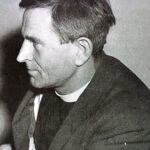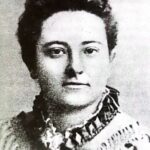Edward R. Roux (1903-March 1966), a prominent mémber of the Communist Party of South Africa in the 1920s and 1930s and a professional botanist, is probably best remembered as the author of two important works of South African political history, Time Longer Than Rope: The Black Man’s Struggle for Freedom in South Africa and S.P, Bunting: A Political Biography.
Roux was born in the Transvaal to an Afrikaner father and English mother, a nurse who immigrated to South Africa. Roux’s father had an unusual upbringing, as he was educated at an English language school in Cape Province and
later apprenticed under a Scottish apothecary. The father became a convert to socialism when Edward was seven years old, and this encouraged the younger Roux’s political development toward Marxism.
From an early age Roux was involved in Marxist political organization, aiding in the formation of a communist youth organization in 1921. Roux had come to political consciousness at the time of the Russian Revolution, and these external events and such internal events as the 1922 miners’ “Red Revolt” led Roux to believe that communism offered the world its greatest chance to attain peace and justice.
Roux joined the recently formed Communist Party of South Africa in l923 where he found a mentor in S.P. Bunting (q.v.), then a vocal force in the Party for the recognition of the key role Africans would have in the Party and any South African revolution to come.
Roux went to university in Johannesburg in the mid-1920s where he studied biology and became honorary secretary of the Communist Party. There, he met Africans involved in a number of political organizations, including the African National Congress and the Industrial and commercial Workers’ Union led by Clements Kadalie. Roux left South Africa for Cambridge in 1926, where he spent three years in study. During this period he also had contact with the British Communist Party, and traveled to Moscow.
Returning to South Africa, Roux took a short-lived job in a research laboratory in Cape Town while throwing himself back into Party work. Having lost his job as a result of his political participation, Roux arranged to take over editing and production of the Party’s newspaper, Umsebenzi, in Cape Town.
Roux’s participation in the Communist Party was affected, as was the participation of many South African members, by the ideological fluctuations and commands issued by Moscow. Roux was caught up in the Party chaos, and was charged with various ideological crimes. He lost the editorship of the Party’s newspaper, which returned to Johannesburg.
Roux remained a member of the Party through 1936, during which time he continued to write for the Party paper and teach in the Party’s night school and other venues. He also spent a few short stints in prison for various political offenses. Roux is remembered for having attempted to offer the nominating speech for the African communist J.B. Marks during a 1932 Germiston by-election.
Africans were not allowed to stand for election, and the gesture was thus symbolic. A white mob attempted to attack Roux during the speech, and Roux barely escaped with his life. Roux’s decision to leave the Party came at a time when a number of the Party’s leading members were being expelled and smeared as “right wing deviationists.”
Among those expelled was Roux’s mentor, S.P. Bunting. Roux returned to his academic pursuits, first taking up a professorship at the University of Cape Town, and then moving to Johannesburg to continue his academic work.
Though no longer a Party member, Roux was among those “named” at the time of the tabling of the Suppression of Communism Act in 1950. In 1963, Roux was forced to renounce his membership in the Liberal Party as a result of further legislation impinging upon the rights of “named” South Africans.
Finally, Roux was banned in 1964, an action which limited his movements to the magisterial district of Johannesburg and enjoined him from entering any educational institution, attend any type of meeting or gathering, or be published. Cut off from any political or professional involvement, Roux died in Johannesburg in 1966.
Roux will undoubtedly be remembered as a vigorously independent political doer and thinker who made his mark on the South African political scene through his organizational and editorial abilities. JOSHUA LAZERSON


